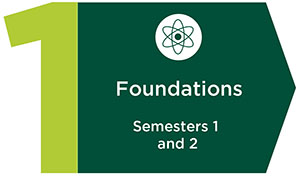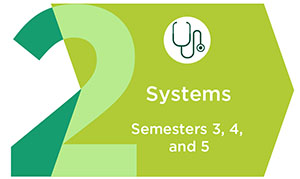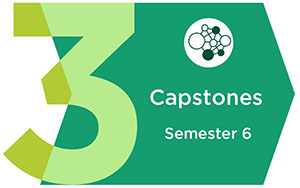Preclerkship Curriculum
The preclerkship curriculum spans years 1 and 2 of the D.O. program. It consists of three segments: Foundations, Systems, and Capstones. Click each section below for descriptions of courses.

Foundations: Semesters 1 and 2
-
The student will develop a base of knowledge and skills in the foundational biomedical sciences and principles of osteopathic medicine. Semester 1 will include gross anatomy and an introduction to osteopathic medicine and clinical skills. Semester 2 begins with an overview of foundational biomedical science principles, followed by two transitional courses that will pair biomedical and clinical sciences. The individual Osteopathic Patient Care (OPC) and Osteopathic Manipulative Medicine (OMM) course series begin in Semester 2 and will continue throughout preclerkship.
-
- OST 510 – Clinical Human Gross Anatomy
Human anatomy is introduced from the gross structural, developmental and radiological perspectives. Students are guided through a review of anatomic structures through interactive course materials, which are reinforced through exploration of prosected donor specimens in the gross anatomy lab. Learning is supplemented by faculty presentations, videos, anatomical software, clinical case discussions, and problem sets.
Course director: Carrie Nazaroff, PhD – Division of Anatomy
Credits: 6
- OST 550 – Introduction to Osteopathic Medicine and Clinical Skills
This new course will present osteopathic principles and practice from day one of medical school. Students will learn palpatory and physical exam skills, and procedures including basic life support certification.
Course directors: Lauren Azevedo, DO – Department of Pediatrics; J’Aimee Lippert, DO – Department of Osteopathic Manual Medicine
Credits: 2
- OST 510 – Clinical Human Gross Anatomy
-
- OST 520 – Foundations of Biomedical Science for Osteopathic Medicine
An interdisciplinary course that will introduce fundamental principles of the interrelated disciplines of physiology, pathology, pharmacology, microbiology, immunology, genetics, and biostatistics. Concepts in the foundational biomedical sciences (FBS) will be further integrated in subsequent systems courses. This course runs in the first half of the fall semester.
Course directors: Raquel Ritchie, PhD – Department of Biochemistry And Molecular Biology; John Taylor, PhD – Department of Microbiology and Molecular Genetics
Credits: 8
- OST 521 – Musculoskeletal System
This course explores the normal function and clinical disorders of the musculoskeletal system from an osteopathic perspective. Instruction will include integrated gross anatomy lab and cases, along with FBS and clinical lectures. This course runs in the second half of fall semester.
Course directors: John Tegtmeier, DO and Harnoor Tokhie, DO – Department of Physical Medicine and Rehabilitation; Anatomy director: Sarah Tilden, PhD
Credits: 4 - OST 522 – Hematology, Oncology, and Infectious Diseases
This course encompasses the cellular biology of the hematopoietic system, as well as principles of clinical hematology and disorders of the blood; oncology and cancer management; and infections, immune responses, and principles of antimicrobial treatment. This course runs in the second half of fall semester.
Course directors: Peter Gulick, DO – Department of Osteopathic Medical Specialties; Dennis Arvidson, PhD – Department of Microbiology and Molecular Genetics
Credits: 3 - OST 551 – Osteopathic Patient Care I
This is the first course in the five-course Osteopathic Patient Care (OPC) series. Emphasis in this semester will be on data gathering and physical examination.
Course director: Lauren Azevedo, DO – Department of Pediatrics
Credits: 2 - OMM 511 – Osteopathic Manipulative Medicine I
This is the first course in the five-course Osteopathic Manipulative Medicine (OMM) series. This course will continue the introduction to palpatory skills, osteopathic structural examination, diagnosis, and Osteopathic Manipulative Treatment (OMT) principles of direct and indirect techniques.
Course director: Catherine Donahue, DO – Department of Osteopathic Manual Medicine
Credits: 1
- OST 520 – Foundations of Biomedical Science for Osteopathic Medicine
Systems: Semesters 3, 4, 5
-
Beginning in Semester 3, the curriculum will follow an organ systems-based approach. Each systems course will explore normal structure and function with integration of biomedical and clinical sciences as well as osteopathic principles. System-specific patient presentations and conditions will be introduced, incorporating clinical reasoning, diagnosis, and management from an osteopathic perspective. The systems in the spring semester include the Neurological System and Psychopathology in Semester 3A, followed by Genitourinary System and Endocrine System in Semester 3B. Semester 4 represents the start of the OMS-II year; courses include the Gastrointestinal System, Integumentary System, and Reproduction, Development, and Sexuality. Semester 5 completes the Systems segment with the Cardiovascular System and Respiratory System. The OPC and OMM longitudinal course series continue throughout this segment, further developing clinical skills and addressing competencies in professionalism, communication, ethics, and interprofessional collaborative care.
-
- OST 523 – Neurological System
This course presents the basic science of neuroanatomy and explores the physiology of the nervous system, including presentations in clinical neurology and ophthalmology.
Course directors: Jayne Ward, DO – Department of Neurology and Ophthalmology; Graham Atkin, PhD – Division of Anatomy
Credits: - OST 524 – Psychopathology
This course will introduce abnormal human behavior and psychopathology. The diagnosis, assessment, and treatment of psychiatric and substance use disorders will be explored.
Course directors: Alyse Ley, DO and Brian Smith, MD – Department of Psychiatry
Credits: 2 - OST 525 – Genitourinary System
This course integrates foundational and clinical sciences in the normal structure and function of the genitourinary system and addresses the diagnosis and management of genitourinary disorders.
Course directors: Laryssa Kaufman, MD – Department of Osteopathic Medical Specialties
Credits: 4 - OST 526 – Endocrine System
This course provides a multidisciplinary to review the normal structure and function of the endocrine system. The pathophysiology, epidemiology, and principles of clinical diagnosis, prevention, and management of endocrine disorders will be introduced.
Course directors: Laryssa Kaufman, MD – Department of Osteopathic Medical Specialties
Credits: 3 - OST 552 – Osteopathic Patient Care II
This is the second course in the five-course Osteopathic Patient Care (OPC) series. Emphasis in this semester will be on the neurological examination, evaluation of patients with endocrine conditions, and sensitive examinations.
Course director: Jason Gumma, DO – Department of Osteopathic Medical Specialties
Credits: 2 - OMM 512 – Osteopathic Manipulative Medicine II
This is the second course in the five-course Osteopathic Manipulative Medicine (OMM) series. This course continues osteopathic structural examination, diagnosis, and Osteopathic Manipulative Treatment (OMT) principles of thoracic, rib, lumbar, pelvic, and sacral regions.
Course director: Catherine Donahue, DO – Department of Osteopathic Manual Medicine
Credits: 1
- OST 523 – Neurological System
-
- OST 531 – Reproduction, Development, and Sexuality
This course will address reproductive anatomy and physiology, including obstetrical and gynecologic diagnoses and treatments, as well as embryologic development and a unit on sex and gender.
Course director: David Boes, DO – Department of Osteopathic Surgical Specialties
Credits: 3 - OST 532 – Integumentary System
This is a case-based clinical review of the integumentary system and dermatological conditions. The course includes team and individual assessments.
Course director: Michelle Gallagher, DO – Department of Pediatrics
Credits: 2 - OST 533 – Gastrointestinal System
This course provides an intensive, integrated, multidisciplinary application of basic science and clinical medicine knowledge in the gastrointestinal system in terms of normal function and disease.
Course director: Catherine Kerschen, DO – Department of Osteopathic Medical Specialties
Credits: 6 - OST 553 – Osteopathic Patient Care III
This is the third course in the five-course Osteopathic Patient Care (OPC) series. Emphasis in this semester will be on integration of data-gathering and physical examination skills within the context of a patient visit, and development of assessments, differential diagnoses, and diagnostic and treatment plans.
Course director: Bret Bielawski, DO – Department of Osteopathic Medical Specialties
Credits: 3 - OMM 513 – Osteopathic Manipulative Medicine III
This is the third course in the five-course Osteopathic Manipulative Medicine (OMM) series. This course introduces Osteopathic structural examination, diagnosis and treatment of the head and neck. It also introduces the viscerosomatic concepts and treatment to parallel the concurrent system courses.
Course director: Mark Gugel, DO – Department of Osteopathic Manual Medicine
Credits: 1
- OST 531 – Reproduction, Development, and Sexuality
-
- OST 534 – Cardiovascular System
This course provides students with a multidisciplinary study of the cardiovascular system in health and disease, including foundational biomedical principles and clinical application.
Course directors: David Strobl, DO – Division of Medical Education; Martha Faner, PhD – Department of Biochemistry and Molecular Biology
Credits: 8 - OST 535 – Respiratory System
This course presents a systems approach to the respiratory system, including normal structure and function and pathologies with integration of basic science and clinical information.
Course director: Mary Hughes, DO – Department of Osteopathic Medical Specialties
Credits: 7 - OST 554 – Osteopathic Patient Care IV
This is the fourth course in the five-course Osteopathic Patient Care (OPC) series. Emphasis in this semester will be on progression of clinical skills, assessment, and plan development in the context of acute-care patient encounters, verbal presentation skills, and quality improvement and patient safety.
Course director: Bret Bielawski, DO – Department of Osteopathic Medical Specialties
Credits: 3 - OMM 514 – Osteopathic Manipulative Medicine IV
This is the fourth course in the five-course Osteopathic Manipulative Medicine (OMM) series. This course introduces current concepts regarding indirect Osteopathic treatment techniques. It includes viscerosomatic concepts and treatment to parallel the concurrent system courses. It also reinforces material from the previous 3 semesters.
Course director: Mark Gugel, DO – Department of Osteopathic Manual Medicine
Credits: 1
- OST 534 – Cardiovascular System
Capstones: Semester 6
-
In the final semester of the preclerkship curriculum, the focus will shift toward application of biomedical and clinical sciences to the delivery of care in the clinical setting. Principles of patient management will be explored in the Ambulatory Care and Hospital Care capstone courses. Other domains of healthcare delivery and infrastructure will be addressed in the Health Systems Science capstone course. Final summative assessments of data gathering, physical examination, documentation, and osteopathic manipulative medicine skills will be assessed in the capstone OSCE examinations. This semester will assist the student in preparing to enter clinical clerkships and to complete the COMLEX-USA Level 1 examination.
-
- OST 561 – Ambulatory Care Capstone
This course will provide an overview of patient care in the ambulatory setting, with a focus on the osteopathic approach to primary care. Content will include principles of health maintenance throughout the age spectrum and across diverse patient populations. Patient presentations and conditions that are common to the ambulatory care setting will be explored, with synthesis and application of knowledge from prior systems and clinical skills courses.
Credits: 3
- OST 562 – Hospital Care Capstone
This course will provide an overview of patient care in the hospital setting, with a focus on the osteopathic approach to medical and surgical care. Content will include principles of inpatient care throughout the age spectrum and across diverse patient populations. Patient presentations and conditions that are common to the inpatient care setting will be explored, with synthesis and application of knowledge from prior systems and clinical skills courses.
Credits: 3
- OST 563 – Health Systems Science Capstone
This course will reinforce or introduce health system science domains, including health systems, healthcare finance, clinical informatics, safety and quality, laws, and ethics, with cross-reference to objectives and sessions in the other capstone courses.
Credits: 2
- OST 555 – Osteopathic Patient Care V
This is the capstone course of the five-course Osteopathic Patient Care (OPC) series. Emphasis in this semester will be on continued progression of clinical skills in the context of both acute and continuing patient care visits, motivational interviewing, and clinical skills for special populations.
Course director: Lauren Azevedo, DO – Department of Pediatrics
Credits: 3 - OMM 515 – Osteopathic Manipulative Medicine V
This is the fifth course in the five-course Osteopathic Manipulative Medicine (OMM) series. This course introduces diagnostic and treatment concepts for common clinical scenarios. It includes viscerosomatic concepts and treatment to parallel the concurrent system courses. It also reinforces material from the previous 4 semesters to prepare the students for boards and clinical practice.
Course director: Mark Gugel, DO – Department of OMM
Credits: 1
- OST 561 – Ambulatory Care Capstone
Clinical Experience
-
Each student will complete a clinical experience during the preclerkship. This requirement may be met by completing a preceptorship rotation in family medicine or an international rotation. Other options to fulfill the clinical experience requirement are currently in development.
-
- FCM 650 – Family Medicine Preceptorship
A one-week experience in a family medicine or primary care office setting. Students may enroll during designated weeks after semester 3.
- FCM 660 – International Preceptorship
The clinical experience requirement may be met through enrollment in this course in conjunction with an international rotation.
- Service Learning Elective – In development
An alternative to the preceptorship, this elective uses a service learning model to develop clinical skills in different communities, with an emphasis on exploring access and barriers to care and social determinants of health and disease.
- FCM 650 – Family Medicine Preceptorship


